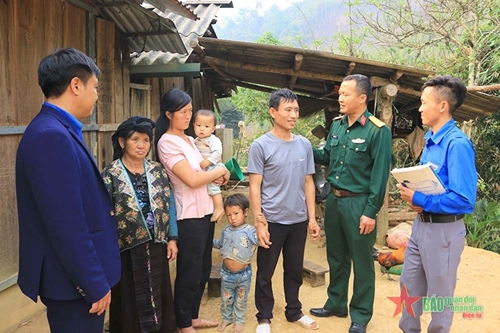Vang A Tru happily shared that troops of Defense-Economic Unit 326 speak the H’mong language fluently. Thus, villagers understand what troops say and vice versa. As a result, they can learn more beneficial ways to raise cows.
Team No.8 is tasked with standing side by side with local authorities to help local people eliminate hunger, reduce poverty, and build strong areas in Pu Hong, Phinh Giang and Na Tong communes of Dien Bien province. Reportedly, in the three communes, H’mong people account for more than 80 percent of the population. Thanks to the fact that troops can speak the H’mong language, it is easier for them to disseminate information and encourage local people to observe the Party’s guideline and the State’s policies and laws, and apply science and technology in production. Thereby, local people have their income improved dramatically, contributing to promoting local economic development and raising the quality of the people’s life.
    |
 |
|
The staff of Defense-Economic Unit 326 encourage local people to build new cultural life. |
Defense-Economic Unit 326 is stationed in a remote and border area with 12 communes in extremely difficult conditions. In order to accomplish political tasks, officers and personnel of the unit have crossed language barriers to get closer to local people, contributing to beautifying the image of Uncle Ho’s soldiers in the hearts of people in border areas.
According to Colonel Nguyen Huu Canh, Deputy Political Commissar of the unit, being aware of the importance of learning ethnic minority languages in mass mobilization work, the unit worked with Son La College to open H’mong language classes for its troops.
During the teaching process, lecturers combined studying programs with extracurricular activities, and field trips, creating excitement for learners during learning the H’mong language.
Additionally, every week, troops must study and read two sentences for daily communication in the H’mong language fluently. Still, the unit has established a group for learning the H’mong language on Zalo and regularly posted words and sentences for daily communication in the group.
Moreover, the unit yearly organizes courses on mass mobilization work and practices and customs of ethnic minority groups in the locality, and carries out policies for ethnic and religious people to effectively implement the locality’s socio-economic development goals. This serves as a bridge connecting troops and people, consolidating people’s trust in the military, accelerating hunger eradication and poverty reduction, and enhancing the quality of border people’s life.
Translated by Quynh Oanh